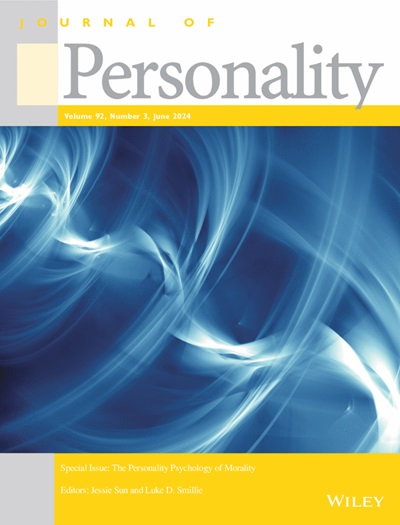Father Trait Anger and Exposure to Infant Cry: Effects on Emotion, Appraisals of Infants, and Cognitive Performance
IF 5
1区 心理学
Q1 Psychology
引用次数: 0
Abstract
ObjectiveTrait anger can impact emotional states, appraisals of others, and cognition. The study aim was to assess in fathers whether these associations are exacerbated by infant crying.MethodThree hundred sixty‐eight fathers were randomly assigned to infant cry, infant babble, or a non‐infant‐related control while completing assessments of cognitive scope, impulse control, or mentalizing. Trait anger (pre‐exposure), emotional state (pre‐ and post‐exposure), and appraisals of the infant (post‐exposure) were assessed.ResultsRegression analyses revealed that trait anger was associated with increased angry emotional state post‐exposure, including feeling like yelling at someone, feeling like hitting someone, and with negative appraisals of infant temperament. Fathers exposed to cry were more likely to feel angry and like yelling at someone post‐exposure than fathers exposed to babble or pink noise, and appraised the infant more negatively and as having less positive intent than fathers exposed to babble. Neither trait anger nor sound condition were associated with cognitive scope, impulse control, or mentalizing performance. No significant interaction effects between trait anger and infant cry condition were found on any of the dependent variables.ConclusionsFathers may benefit from support to modulate their responses to infant cry. Fathers with higher trait anger may benefit from intervention to manage responses to both positive and negative infant expressions.父亲特质愤怒与婴儿哭声暴露:对情绪、婴儿评价和认知表现的影响
特质性愤怒会影响情绪状态、对他人的评价和认知。这项研究的目的是评估父亲们是否会因为婴儿哭泣而加剧这些联系。方法368名父亲被随机分配到婴儿哭闹、婴儿牙牙学语或与婴儿无关的控制组,同时完成认知范围、冲动控制或心理化评估。评估特质性愤怒(暴露前)、情绪状态(暴露前和暴露后)和婴儿评价(暴露后)。结果回归分析显示,特质性愤怒与暴露后愤怒情绪状态的增加有关,包括想对某人大喊大叫、想打人,以及对婴儿气质的负面评价。与暴露在胡言乱语或粉红噪音中的父亲相比,暴露在哭声中的父亲更容易感到愤怒,喜欢对别人大喊大叫,并且比暴露在胡言乱语中的父亲更消极地评价婴儿,并且没有积极的意图。特质性愤怒和健康状况都与认知范围、冲动控制或心理表现无关。特质性愤怒与婴儿啼哭状况在任何因变量上均未发现显著的交互作用。结论父亲可能受益于支持来调节他们对婴儿哭泣的反应。具有较高特质性愤怒的父亲可能会从干预中受益,以管理对婴儿积极和消极表达的反应。
本文章由计算机程序翻译,如有差异,请以英文原文为准。
求助全文
约1分钟内获得全文
求助全文
来源期刊

Journal of Personality
PSYCHOLOGY, SOCIAL-
CiteScore
9.60
自引率
6.00%
发文量
100
期刊介绍:
Journal of Personality publishes scientific investigations in the field of personality. It focuses particularly on personality and behavior dynamics, personality development, and individual differences in the cognitive, affective, and interpersonal domains. The journal reflects and stimulates interest in the growth of new theoretical and methodological approaches in personality psychology.
 求助内容:
求助内容: 应助结果提醒方式:
应助结果提醒方式:


